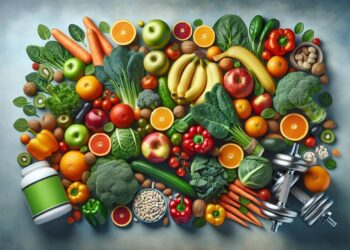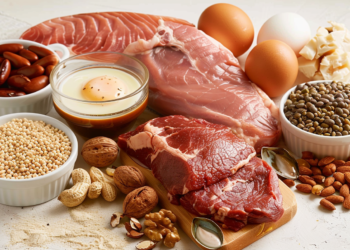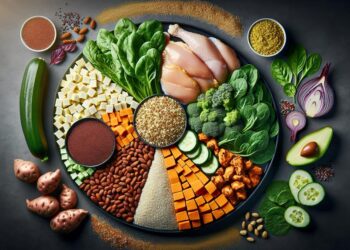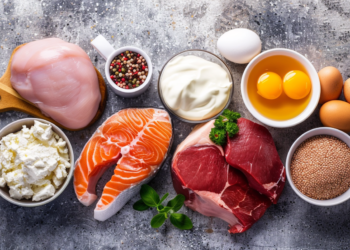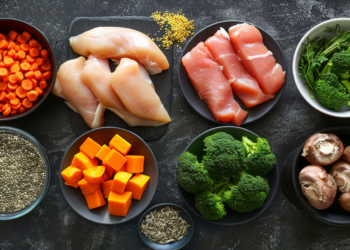Yearning to kickstart muscle growth? Discover the ultimate beginner’s nutrition plan for musclebuilding – essential for achieving optimal results.
For beginners in musclebuilding, a detailed nutrition plan ensuring a caloric surplus is key. Balance proteins, carbs, and fats. Protein aids muscle repair and growth; carbs replenish energy stores; fats are essential for health. Vary protein sources, include shakes, manage portion sizes. Opt for low GI carbs like whole grains, prioritize fiber. Healthy fats aid energy, hormone balance; use nuts, avocado. Time meals around workouts, hydrate well, snack strategically, incorporate pre/post-workout nutrition. Consider whey, creatine, BCAAs but follow dosages. Track progress, adjust as needed. This thorough plan sets the foundation for muscle growth.
Key Takeaways
- Consume a caloric surplus for muscle growth.
- Prioritize proteins for muscle repair and growth.
- Include complex carbs for sustained energy.
- Incorporate healthy fats for hormone support.
- Track progress and adjust nutrition accordingly.
Macronutrient Ratios
When building muscle, we prioritize macronutrient ratios to optimize our nutritional intake for growth and recovery. Achieving a caloric surplus is essential for muscle growth, as it provides the extra energy needed for the body to build and repair muscle tissue. Macronutrients, such as proteins, carbohydrates, and fats, play important roles in supporting this process. The timing of nutrient intake also influences muscle growth by affecting nutrient absorption and utilization.
Proteins are essential for muscle building, but carbohydrates and fats are equally significant. Proteins provide the necessary amino acids for muscle repair and growth. Carbohydrates serve as the primary energy source during workouts, replenishing glycogen stores and supporting muscle recovery. Fats are crucial for hormone production and overall health. Balancing these macronutrients in the right ratios ensures excellent performance and recovery.
Timing plays a critical role in nutrient absorption and utilization. Consuming a balanced meal with adequate protein, carbohydrates, and fats before and after workouts can enhance muscle growth and recovery. Pre-workout nutrition provides the energy needed for exercise, while post-workout nutrition replenishes glycogen stores and aids in muscle repair. Spacing out meals evenly throughout the day ensures a steady supply of nutrients for muscle building and maintenance.
Protein Intake Guidelines

To optimize muscle growth and recovery, it’s essential to establish appropriate protein intake guidelines based on individual needs and goals. When it comes to building muscle, protein plays an important role in repairing and building muscle fibers damaged during exercise. Here are some key points to take into account when determining your protein intake:
- Amino Acid Sources: Make sure your protein intake includes a variety of amino acid sources such as lean meats, poultry, fish, eggs, dairy, legumes, and tofu to support muscle repair and growth.
- Protein Shakes: Supplementing with protein shakes can be convenient to meet your daily protein requirements, especially after workouts when fast-digesting protein is beneficial for muscle recovery.
- Meal Frequency: Aim to distribute your protein intake evenly across meals throughout the day to support muscle protein synthesis effectively.
- Portion Sizes: Pay attention to portion sizes to ensure you’re consuming adequate protein per meal without overeating, as excess protein consumption may not provide additional benefits for muscle building.
Carbohydrates for Energy

Carbohydrates play an important role in musclebuilding. They serve as the primary source of energy for our bodies during physical activity and are essential for fueling musclebuilding workouts efficiently. When it comes to musclebuilding, the right carbohydrate choices can have a significant impact on performance. Opting for carbohydrates with a lower glycemic index can provide a sustained release of energy, supporting endurance during workouts and promoting better muscle recovery post-exercise. Foods like whole grains, sweet potatoes, and legumes are excellent choices due to their slow digestion and steady energy release.
Additionally, fiber intake plays a key role in musclebuilding. High-fiber carbohydrates not only aid in digestion but also help maintain stable blood sugar levels, preventing energy crashes during workouts. Adequate fiber intake is linked to improved overall performance and better nutrient absorption, which are both important for muscle growth and recovery.
Understanding the role of carbohydrates in musclebuilding is essential for beginners looking to optimize their nutrition plan. By selecting carbohydrates with a lower glycemic index and incorporating high-fiber options, individuals can enhance their workout performance and support muscle growth effectively. Remember, the key is to strike a balance between carbohydrates, proteins, and fats to create a well-rounded nutrition plan that fuels your body for success in musclebuilding endeavors.
Importance of Dietary Fats

Exploring the importance of incorporating dietary fats into a musclebuilding nutrition plan is essential for optimizing performance and supporting overall muscle growth. When it comes to building muscle, healthy fats play an important role in providing energy, supporting hormone production, and aiding in nutrient absorption.
Here are some key points to keep in mind:
- Healthy fats benefits: Including sources of healthy fats such as avocados, nuts, seeds, and olive oil in your diet can help reduce inflammation, support brain function, and provide a concentrated form of energy essential for intense workouts.
- Essential fatty acids: Omega-3 and Omega-6 fatty acids are essential fats that the body can’t produce on its own. These fatty acids play a significant role in muscle recovery, joint health, and overall well-being.
Incorporating a variety of healthy fats into your musclebuilding nutrition plan can lead to improved performance, better recovery, and enhanced muscle growth. Remember, moderation and balance are key when it comes to dietary fats. By making informed choices and prioritizing sources of healthy fats, you can optimize your musclebuilding journey and achieve your fitness goals effectively.
Meal Timing Strategies

Incorporating strategic meal timing practices is essential for maximizing muscle growth and recovery efficiency in a musclebuilding nutrition plan. Meal timing can impact muscle building by optimizing nutrient delivery, enhancing protein synthesis, and regulating energy levels throughout the day. Two key factors to take into account in meal timing are fasting benefits and nutrient timing. Fasting benefits can be leveraged by incorporating intermittent fasting protocols to potentially enhance metabolic health and promote fat loss, while nutrient timing focuses on consuming the right nutrients at specific times to support muscle growth and recovery.
To illustrate the importance of meal timing strategies, consider the following table:
| Meal Timing Strategy | Impact on Muscle Growth |
| Pre-Workout Nutrition | Provides energy for workouts and kickstarts muscle protein synthesis. |
| Post-Workout Nutrition | Enhances recovery by replenishing glycogen stores and promoting muscle repair. |
| Intra-Workout Nutrition | Sustains energy levels during intense training sessions and prevents muscle breakdown. |
| Bedtime Snack | Supplies nutrients for overnight muscle recovery and growth. |
Moreover, meal frequency plays a significant role in muscle growth. Consuming protein-rich meals every 3-4 hours can help maintain a positive nitrogen balance and support muscle protein synthesis throughout the day. By strategically timing your meals and snacks, you can optimize muscle-building processes and progress towards your fitness goals effectively.
Hydration for Muscle Growth

To optimize muscle growth and performance, adequate hydration is key in supporting physiological functions and promoting muscle recovery. Proper hydration is essential for maintaining electrolyte balance and ensuring peak performance during workouts.
Here are some key points to keep in mind regarding hydration for muscle growth:
- Electrolyte Balance: Balancing electrolytes such as sodium, potassium, and magnesium is vital for muscle contractions, nerve function, and overall hydration status. Sweat loss during exercise can lead to electrolyte imbalances, impacting performance and recovery.
- Performance: Dehydration can greatly impair exercise performance, leading to decreased strength, endurance, and overall workout capacity. Ensuring adequate hydration before, during, and after training sessions is crucial for maximizing performance and muscle growth.
- Water Consumption: Adequate water intake is essential for maintaining hydration levels, supporting nutrient delivery to muscles, and promoting muscle recovery. Monitoring water consumption throughout the day is key to preventing dehydration and optimizing muscle-building processes.
- Muscle Growth: Proper hydration is directly linked to muscle protein synthesis, which is vital for muscle repair and growth. Staying hydrated aids in nutrient absorption, cellular function, and overall muscle recovery post-exercise.
Pre-Workout Nutrition Tips

A vital pre-workout meal is essential for providing the necessary energy and nutrients to optimize exercise performance and support muscle growth. Meal timing plays an important role in ensuring that your body has an adequate supply of fuel to power through your workout effectively. Ideally, you should consume a meal rich in carbohydrates and moderate in protein 2-3 hours before your workout to allow for proper digestion and absorption. This timing helps in providing a sustained release of energy during your exercise session. Here are some pre-workout nutrition tips to keep in mind:
| Meal Timing | Energy Sources |
| 2-3 hours before exercise | Complex carbohydrates like whole grains, fruits |
| 30 minutes before exercise | Simple carbohydrates like a banana or energy bar |
| Avoid heavy meals | Lean proteins such as chicken or tofu |
| Stay hydrated | Healthy fats like nuts or avocado |
Post-Workout Recovery Foods

After completing a workout session, selecting the appropriate post-workout recovery foods is essential for replenishing energy stores and aiding muscle repair. Nutrient timing plays an important role in optimizing recovery and muscle growth.
Here are some top choices for post-workout recovery foods:
- Protein: Consuming protein-rich foods post-workout is essential for muscle repair and growth. Opt for sources like chicken, eggs, Greek yogurt, or protein shakes to support muscle recovery.
- Carbohydrates: Replenishing glycogen stores is necessary after a workout to restore energy levels. Choose complex carbohydrates such as sweet potatoes, quinoa, brown rice, or fruits like bananas to refuel effectively.
- Healthy Fats: Including sources of healthy fats like avocados, nuts, seeds, or olive oil can help reduce inflammation and support overall recovery processes post-exercise.
- Hydration: Rehydrating after a workout is important for maintaining optimal performance and supporting recovery. Water is essential, but you can also include electrolyte-rich beverages or coconut water to replenish lost fluids and minerals.
Supplements for Beginners

When considering supplements for beginners in musclebuilding, it’s important to prioritize those that have been scientifically proven to enhance performance and support muscle growth. Supplement recommendations for beginners often include whey protein, creatine, and branched-chain amino acids (BCAAs).
Whey protein is a convenient and effective way to increase protein intake, which is essential for muscle growth. Creatine has been extensively researched and shown to improve strength and power, making it a valuable supplement for beginners looking to enhance their performance in the gym. BCAAs can aid in muscle recovery and reduce muscle soreness, supporting beginners in their musclebuilding journey.
One of the most common beginner mistakes when it comes to supplements is overcomplicating their regimen. Many beginners fall into the trap of thinking they need a wide array of supplements to see results. In reality, focusing on a few key supplements like protein, creatine, and BCAAs is often sufficient.
Additionally, beginners may have misconceptions about supplement dosages. It’s important to follow the recommended dosages provided by the supplement manufacturers or consult with a healthcare professional to guarantee safe and effective usage.
Tracking Progress and Adjustments

To effectively monitor progress and make necessary adjustments during muscle building, it’s essential to establish a systematic tracking system that includes key metrics such as strength gains, body measurements, and workout performance. Setting clear goals is pivotal for staying motivated and focused on your muscle-building journey.
Tracking your macros diligently can provide valuable insights into your nutritional intake, helping you make informed decisions about your diet. Monitoring progress not only allows you to celebrate your achievements but also helps identify areas that may need improvement.
Here are some essential tips for tracking progress and making adjustments:
- Set Specific, Measurable Goals: Establish clear objectives that you can track over time to stay motivated and on track.
- Track Macros and Progress: Keep a detailed record of your macronutrient intake and regularly assess your progress to adjust your diet as needed.
- Measure Body Changes: Track changes in body measurements, such as muscle mass and body fat percentage, to gauge your progress accurately.
- Assess Workout Performance: Monitor your strength gains, endurance, and overall performance in the gym to make sure you’re progressing towards your goals effectively.
Frequently Asked Questions
Can Muscle-Building Nutrition Plans Be Adjusted for Different Body Types?
Absolutely, muscle-building nutrition plans can be customized for different body types. It’s essential to take into account body composition when tailoring diets. By adjusting macronutrient ratios and caloric intake, individuals can optimize their muscle growth potential.
How Can Beginner Muscle Builders Manage Food Cravings and Cheat Meals?
Let’s tackle those tempting cravings and navigate cheat meals with mindful eating. Understanding our triggers and having strategies in place empowers us to stay on track while enjoying occasional indulgences guilt-free.
Are There Specific Nutrition Considerations for Female Muscle-Building Beginners?
When considering nutrition for female muscle-building beginners, it’s important to address hormonal influences and specific dietary needs. Muscle recovery and nutrient timing play essential roles in optimizing progress and achieving desired results.
What Role Does Sleep Quality Play in Muscle-Building Nutrition?
Sleep quality is essential for muscle-building success. It influences recovery benefits, performance, hormonal regulation, and metabolism. Research shows that inadequate sleep can lead to decreased muscle gains. Prioritizing rest is key for best results in fitness endeavors.
How Can Beginners Balance Muscle-Building Nutrition With Social Events or Dining Out?
Balancing social events with muscle-building nutrition can be tricky. We prioritize meal prep for consistency but also allow flexibility when dining out. Planning ahead and making smart choices help us stay on track.
Conclusion
In summary, for musclebuilding beginners, focusing on the right macronutrient ratios, protein intake, carbohydrates for energy, and dietary fats is essential.
Implementing meal timing strategies, pre-workout nutrition tips, post-workout recovery foods, and appropriate supplements can also enhance muscle growth.
By tracking progress and making necessary adjustments, beginners can optimize their nutrition plan for best results.
Remember, consistency is vital for building muscle mass and achieving your goals.





